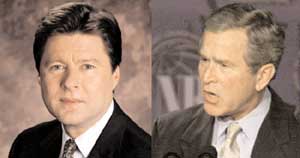-
- City Council approves transgender protections in preliminary vote
- Center to host monthly coalition building breakfasts
- GLBT Dems announce annual Pride reception
- San Diego to host international women’s event during Pride
- Mass commitment ceremony to be held at San Diego Pride festival, July 27
- Community News
-
- California domestic partners granted equal property tax rights
- Gay and lesbian protections sought in Phelps’ hometown
- Federal appeals court rules Connecticut can bar Scouts from charity list
- Supremes’ ruling on gay sex leaves Bush in ‘compassionate’ quandary
- Gay-straight alliance sues Texas school district
- Transgender man’s killer to remain on death row
- Gays seeking wedlock cautioned not to rush to Canada
- National News Briefs
- World News Briefs
national
Supremes’ ruling on gay sex leaves Bush in ‘compassionate’ quandary
Major Democratic presidential contenders oppose gay marriage, but also DOMA
Published Thursday, 17-Jul-2003 in issue 812
WASHINGTON (AP) — President Bush and his Democratic rivals face conflicting political interests as they grapple with the fallout from a landmark Supreme Court ruling that left conservatives in a tizzy and GLBT Americans intent on expanding their rights.
For now, both sides have chosen to equivocate — blurring their views on gay marriage behind a veil of non-answers and fuzzy rhetoric. But the campaign and a confluence of legal events will soon force the presidential field to stake out positions that could reverberate throughout the 2004 race. Bush, who ran as the “compassionate conservative” in 2000, is caught between his political base — conservatives opposed to gay rights — and some advisers who fear that any hint of intolerance will alienate critical swing voters.
“Every politician is concerned about how the voters will look at an issue like this,” Genevieve Wood, spokesperson for the conservative Family Research Council, said even as she warned the White House: “The reality is the voters who put Bush in office are not gay activists.”
Some of their staunchest backers are pushing to legalize gay marriage and expand rights for gays and lesbians, policies that some say may be viewed as runaway liberalism to voters in the middle.
As a result, the Democratic candidates have adopted a cover-all-angles position: While the top six candidates all say they oppose same-sex marriages, they reject the notion of a constitutional amendment that would ban such unions.
In its 6-3 ruling last month, the Supreme Court threw out a Texas law that prohibited acts of sodomy between members of the same sex in a private home, saying such a prohibition violates the defendants’ privacy rights under the Constitution.
Polls suggest Americans agree with the court’s ruling, though public opinion is less clear about what rights to give gay couples. While a solid majority of voters say they oppose gay marriages, they are much more inclined to support civil unions and other expansions of rights.
Of the nine Democrats, only Al Sharpton, Carol Moseley Braun and Rep. Dennis Kucinich of Ohio have indicated their support for gay marriages, said David Smith of the Human Rights Campaign.
The remaining six, all top-tier candidates, side with the majority of Americans and against groups like the HRC.
“We’re disappointed they have chosen not to support allowing gay people to marry,” Smith said.
The major Democratic candidates and gay activists are united against a proposed constitutional amendment, favored by Senate Majority Leader Bill Frist (R-Tennessee) that would ban gay marriages. Responding to an Associated Press survey, Sen. Joe Lieberman of Connecticut and Sen. John Edwards of North Carolina said through aides that gay marriage is an issue for states to resolve. Sen. John Kerry of Massachusetts, former Vermont Gov. Howard Dean and Rep. Dick Gephardt of Missouri chided Republicans for pushing the measure.
“I believe that those seeking to (pass the amendment) are chiefly motivated by political considerations,” Kerry said. As governor of Vermont, Dean signed a civil-union bill that conferred state benefits to same-sex couples. He has made a point of saying the law did not endorse gay marriages, a distinction with little legal difference.
“We have full civil marriage rights (for gays and lesbians), we just don’t call it marriage,” Dean said in September 2002. More recently, Dean said as president he would not tell states they had to have civil union or gay marriage laws. Still, he would “insist that every state find a way to recognize the same legal rights for gay couples as they do for everybody else.”
Some gay rights activists said Dean was trying to have it both ways, a criticism certain to be raised this week when Dean and several of his Democratic rivals attend the Human Rights Campaign forum.
Shortly after the Supreme Court ruling, Bush reaffirmed his belief that “marriage is between a man and a woman,” but he sidestepped the constitutional amendment question.
“I don’t know if it’s necessary yet,” the president said. “Let’s let the lawyers look into it.”
The White House legal team will review the proposed amendment as well as other options, including strengthening the Defense of Marriage Act. Signed by President Clinton, the law allows states not to recognize same-sex unions from other states.
Bush also will wait to see how a Massachusetts court rules on a same-sex marriage case, White House officials said. That ruling, slated for July 14, has been delayed.
|
|
Copyright © 2003-2025 Uptown Publications


